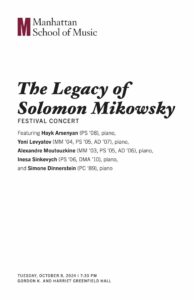By Rien Takaci

Attending classical concerts was something I never thought I would enjoy. Growing up, I often saw cartoons and movies where classical concerts were depicted as boring, and the characters would fall asleep in the audience. These representations made me believe that classical music wasn’t something I could relate to. However, as part of my music class this semester, I was required to attend a classical concert. After doing some research, I found a live-streamed performance from the Manhattan School of Music titled “Legacy of Solomon Mikowsky.” Given my busy schedule during that week, I could not attend the concert in person. Instead, I watched the concert via livestream on October 8th, 2024. What I experienced changed many of my preconceived notions about classical music and its audience.
The “Legacy of Solomon Mikowsky” concert was held to honor Professor Solomon Mikowsky, a renowned piano teacher at the Manhattan School of Music, and the program featured several of his accomplished students: Hayk Arsenyan (PS ’08), Yoni Levyatov (MM ’04, PS ’05, AD ’07), Alexandre Moutouzkine (MM ’03, PS ’05, AD ’06), Inesa Sinkevych (PS ’06, DMA ’10), and Simone Dinnerstein (PC ’89). Each performer brought a unique approach to their piece, showing the diverse influence Mikowsky had on their musical development. They performed compositions from a range of composers, including Antonio Soler, Frédéric Chopin, Sergei Rachmaninoff, Claude Debussy, and Keith Jarrett.
Among the performers, Hayk Arsenyan and Alexandre Moutouzkine stood out the most. Arsenyan opened the program with Antonio Soler’s Sonata in C Minor, Movement 2 and 1. His expressive playing conveyed warmth and gratitude, creating a personal connection with the audience. I particularly appreciated the elegance and clarity with which he performed Soler’s complex sonatas. He followed this with his original composition, Uprooted 2, and concluded with Sergei Rachmaninoff’s Prelude in G-Sharp Minor, Op. 32, No. 12. His performance was a masterclass in emotional storytelling and technical precision.
The program featured a mix of Baroque, Classical, Romantic, and contemporary compositions. Among the composers, Antonio Soler (1729–1783) may not be as well-known as composers like Mozart or Beethoven, but he is an important figure in classical music, especially for those interested in Spanish music. He is often called “the most original and most gifted of the 18th-century Spanish composers” (Sadowsky 12). Soler is highly respected by musicologists and pianists for his keyboard sonatas, his works exemplify “absolute music,” leaving their interpretation open to the listener.
Alexandre Moutouzkine performed Sergei Rachmaninoff’s Sonata No. 2 in B-flat Minor, Op. 36, a demanding piece that showcased his technical agility and emotional range. Watching him navigate the sonata’s dramatic shifts— Allegro Agitato, Non Allegro – Lento, and Allegro Molto —was mesmerizing. He performed the entire work from memory, a performance that underscored his deep connection to the music and his mastery of the piano.
Sergei Rachmaninoff (1873–1943), a great figure in late Romantic music, was recognized for his virtuosic piano compositions and orchestral works (Flangan, 8). His works are characterized by their lush harmonies, emotional depth, and a nostalgic connection to the Romantic era. He is also associated with pieces like the Prelude in C-sharp Minor and The Isle of the Dead, which demonstrate his ability to evoke vivid imagery and powerful emotions (Flangan 8).
The other performers also delivered compelling performances. Yoni Levyatov’s interpretation of W.A. Mozart’s Six Variations in F Major, KV 547b was both playful and sophisticated. Inesa Sinkevych offered a beautiful performance of Frédéric Chopin’s Mazurkas, Op. 50 and Claude Debussy’s Ondine and Ce qu’a vu le vent d’ouest, both from Préludes. Simone Dinnerstein closed the program with a graceful performance of pieces from Rameau’s Suite in A minor, RCT 5 and Keith Jarrett’s Encore from Tokyo.
I was amazed by the fact that I was watching a live-streamed performance, but it was still so captivating. I believe this was a result of my organizing my room, setting up my PC and sound system, and making sure to eliminate distractions by leaving my phone out of the room. This allowed me to fully focus on the performance. While I imagine that attending in person would have offered a more immersive atmosphere, with the sound and setting adding to the experience, I was still deeply engaged.
In conclusion, the “Legacy of Solomon Mikowsky” concert was a remarkable experience that significantly transformed my perspective on classical music. From the exceptional performances of the talented musicians to the diverse and emotionally charged compositions, the event showed the power and beauty of classical music in ways I had never anticipated. Each performer brought their unique style to the program, and the concert not only honored the legacy of Solomon Mikowsky but also demonstrated the ongoing relevance and vitality of classical music. Despite my initial reservations, this concert proved to be an engaging and enriching experience, one that I would highly recommend to anyone, whether they are new to classical music or a seasoned listener.
Works Cited
Flanagan, William. “Sergei Rachmaninoff: A Twentieth-Century Composer.” Tempo, no. 22, 1951, pp. 4–8. JSTOR, http://www.jstor.org/stable/943071. Accessed 25 Nov. 2024.
“Hayk Arsenyan – Concert Pianist.” Hayk Arsenyan – Concert Pianist, www.haykarsenyan.com/. Accessed 13 Dec. 2024.
“Hayk Arsenyan.” Summit Music Festival and Institute, http://summitmusicfestival.org/staff-members/hayk-arsenyan/. Accessed 25 Nov. 2024.
Sadowsky, Reah. “Antonio Soler: Creator of Spain’s Fifth Century of Musical Genius.” American Music Teacher, vol. 28, no. 1, 1978, pp. 10–15. JSTOR, http://www.jstor.org/stable/43538186. Accessed 25 Nov. 2024.
